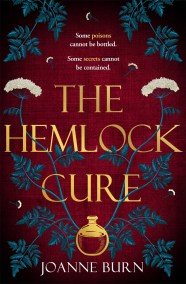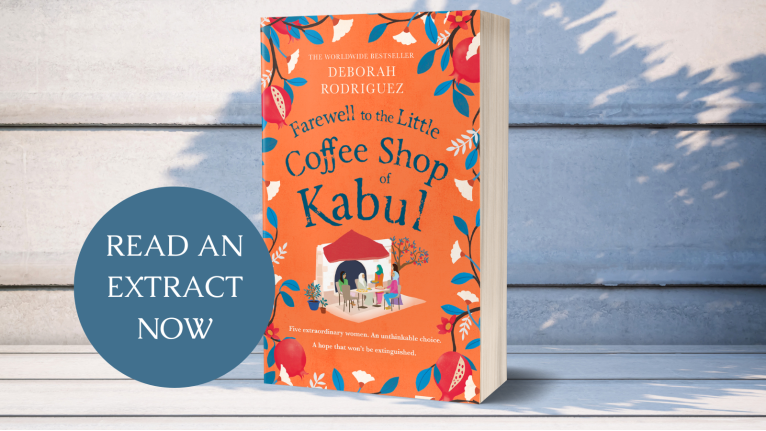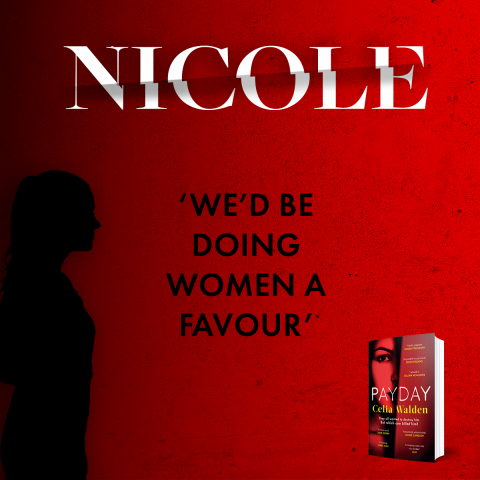Read an Extract from The Hemlock Cure by Joanne Burn
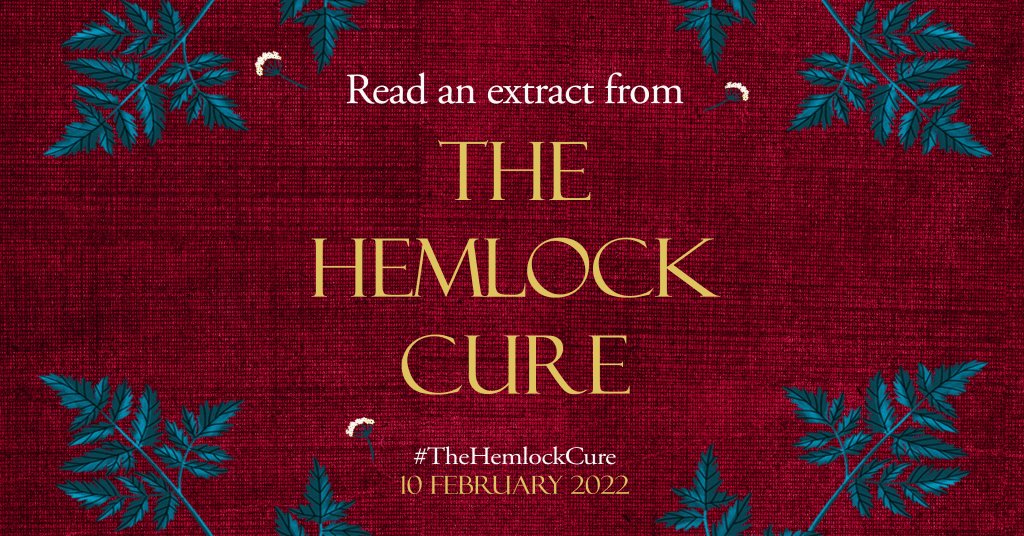
Based on the real history of an English village during the Great Plague, The Hemlock Cure is an utterly beguiling tale of fear and ambition, betrayal, self-sacrifice and the unbreakable bond between two women. Read an exclusive early extract . . .
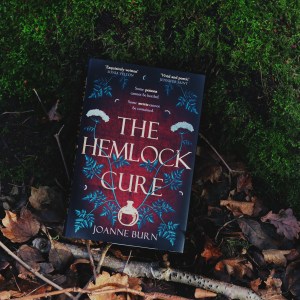
Mae lifts the heavy iron knocker – a coiled serpent – at the great door of Bradshaw Hall, and lets it fall three times. Then she tips her head backwards to regard the majestic stag carved in stark relief above the entrance. She turns in the direction of its faraway gaze – towards the moors of Bleak Low and the heights of Longstone Edge – as if they might observe something there together.
A shriek tells her that Isabel’s two youngest sons are playing together on the hillocks of sandstone at the back of the hall, chasing one another round the stacks of rotting timbers and joists, playing hide and seek in the phantom wings that were half-built years ago when Elizabeth Bradshaw’s husband was still alive. Now they crumble, imagined but never finished, darkness where there should have been windows, wild flowers growing from the abandoned masonry. Some say this is what happens when a woman is left in charge of a great house. It belongs to Elizabeth’s sons, but those boys still wet the bed at night and need their meat cutting for them at the dinner table.
Mae is brought through the Great Hall with its familiar tapestries and vast table long enough for twenty-four guests. She knows the housekeeper from the rear better than she knows her face: her rump as wide as any mare, her plaited hair the colour of toffee, the quick, rhythmic slap of her boots on the stone. Always the same gesture as they reach the corridor to the kitchen: a sweep of her hand, as if Mae might forget where she is going and follow the housekeeper onwards to whatever task has her occupied elsewhere in the house. However perfunctory that little hand gesture, no matter the lack of conversation, they are bound together as allies; Mae’s presence at Bradshaw Hall every Monday evening is not to be spoken of outside these walls. Elizabeth Bradshaw has given her staff strict instruction on the matter. It is the end of the day and the kitchen is scrubbed clean, the floors are swept, Cook’s apron is filthy. The room has the settled feeling of a creature readying itself for sleep. Cook is finishing a Lombard pie for tomorrow, sliding a knife beneath the top crust – steam rushing out – and Mae slows to watch her ladle cream and eggs over the meat and spiced dried fruit.
Through a door, she leaves the quiet of the kitchen behind and enters the stillroom. The place is awash with the scent of roses. Tall windows flood the chessboard floor with the evening light, and amber sunbeams bounce from the copper stills. She looks to the glass objects on the long shelves that run the length of the room: bottles and flasks lined up like shapely soldiers. Something within her settles at the sight of everything in its place. Her eyes skim the pestles and mortars, the scales and weights, the gallypots and graters, strainers and sieves, the two dozen tin vessels – diverse in size with a multitude of spouts. She passes the cold furnaces and braziers, then the heat of one that is gently bubbling. She eyes the two women — Mother’s closest friends — deep in conversation at the far end of the room. Isabel’s hand is clenched around Elizabeth’s upper arm as if they are discussing something earnestly, something of gravity. But then they erupt in laughter and grasp one another to steady themselves.
Isabel looks up at Mae as she draws close. She stretches an arm wide so Mae can lean against her momentarily. It is all soft, all warmth – Isabel’s body like a new pillow stuffed with the lightest down. Her thick waves of silver hair (she is not yet thirty-eight) tickle Mae’s face. She smells of lavender and cinnamon pastries. But then the moment is gone and Isabel squeezes Mae’s arm accusingly through her shawl and shift – as if the arm has no right to be there.
‘Skin and bone,’ she says, her brow furrowing. She looks Mae up and down, appraisingly, as if she can see right through the layers of linen to Mae’s collection of bones: the undulations of her ribs and hips.
‘Your mother was never so thin,’ she says, as if believing Mae guilty of some conspiracy.
If she cared to, she could go on: your mother was never so small, her hair was never so dark, her eyes were never so close together.
‘Dear Florence,’ says Elizabeth then, pushing a wisp of red hair behind her ear. Their attention falls to reminis- cing about Florence in the way that is simple once a person is dead: speaking only of virtues. Mae listens eagerly to Mother’s friends for any new droplet that she has not heard before. Tell me more, she used to say. Tell me more. She would scrape that jar of memories if she could, lick them sticky from her fingers, savouring the taste for days afterwards.
Sometimes the women talk of me, but not so much; they struggle, you see, to speak of me warmly.
They speak easily though, then, of unguents and waters, balms and cordials. And Mae fiddles with the small brass alembic waiting to be put to good use on the long wooden table – upending its funnel, tapping the glass receiver. Sometimes she gives the appearance of not listening, but she does not miss a word. The evenings she spends at Bradshaw Hall – with these women that remember Mother and care to speak of her, these women who do not think Mae’s education a folly – are a potent therapeutic.
Order yours now:
The entrancing historical read p
erfect for readers of Hamnet and The Manningtree Witches
'Vivid and poetic'
JENNIFER SAINT
'Mesmerizing'
ROSIE ANDREWS
'Page-turning'
SUSAN STOKES-CHAPMAN
'Beautiful'
ANNIE GARTHWAITE
'Exquisitely written'
SONIA VELTON
'Fascinating'
LIZ HYDER
'Heart-wrenching'
REBECCA F. JOHN
'Wholly original'
SARAH BURTON
'Exquisite'
EMMA CARROLL
'Bewitching'
ROZ WATKINS
'Spellbinding'
NIKKI MARMERY
It is 1665 and the women of Eyam keep many secrets.
Isabel Frith, the village midwife, walks a dangerous line with her herbs and remedies. There are men in the village who speak of witchcraft, and Isabel has a past to hide. So she tells nobody her fears about Wulfric, the pious, reclusive apothecary.
Mae, Wulfric's youngest daughter, dreads her father's rage if he discovers what she keeps from him. Like her feelings for Rafe, Isabel's ward, or that she studies from Wulfric's forbidden books at night.
But others have secrets too. Secrets darker than any of them could have imagined.
When Mae makes a horrifying discovery, Isabel is the only person she can turn to. But helping Mae will place them both in unspeakable peril.
And meanwhile another danger is on its way from London. One that threatens to engulf them all . . .
Based on the real history of an English village during the Great Plague, The Hemlock Cure is an utterly beguiling tale of fear and ambition, betrayal, self-sacrifice and the unbreakable bond between two women.

